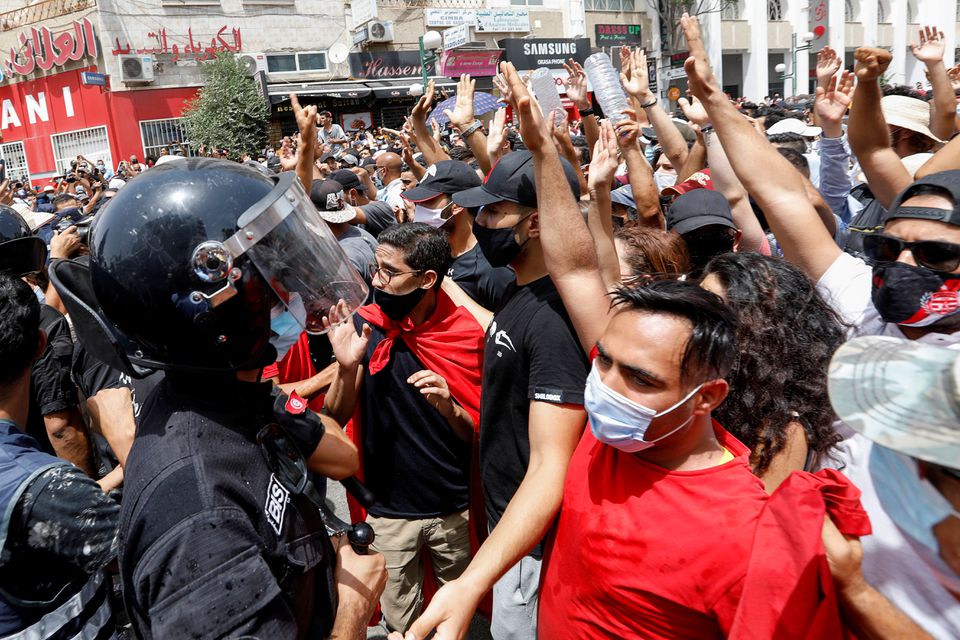www.aljazeerah.info
Opinion Editorials, July 2021
Archives
Mission & Name
Conflict Terminology
Editorials
Gaza Holocaust
Gulf War
Isdood
Islam
News
News Photos
Opinion Editorials
US Foreign Policy (Dr. El-Najjar's Articles)
www.aljazeerah.info
Tunisian President Break with Populism and his Intention to Implement Reforms Moez Labidi Interviewed By Imen Gharb Tunisian Press Agency, July 28, 2020 Editor's Note: This opinion editorial article was published on the official website of the Tunisian Press Agency, which indicates that it is pro-president. It's noteworthy that the Speaker of the Tunisian Parliament, Rashid Al-Ghannoushi, described the President sacking of the Prime Minister and the suspension of the Parliament is a coup against the revolution and the constitution. |
 |
 |
 |
| Tunisians protesting the economic conditions, July 25, 2021 | Speaker of the Tunisian Parliament, Rashid El-Ghannoushi, on Twitter: What President Qays Si-'ayyid did is a coup against the revolution and the Constitution. Al-Nahda supporters and the Tunisian people will defend the revolution (July 25, 2021). |
"Break with populism and dare to implement reforms to avoid scenario of getting stuck in crisis," Moez Labidi.
Tunisian Press Agency, 27/07/2021
An Interview By Imen Gharb-TAP -
The decision of the President of the Republic to suspend the parliament and dismiss Prime Minister, Hichem Mechichi is far from surprising, because history always teaches us that the deterioration of the fundamentals of the economy and the status quo in terms of reforms are often threatening to the democratic edifice, said Tuesday, economist Moez Labidi, in an interview with TAP.
Labidi calls, however, to seize this opportunity to break with
populism, impose the rule of law and dare to implement the reforms, by
reviving the economic pragmatism. Any delay will, according to him,
further bog down the country in the crisis and precipitate the scenario
of a default and civil disobedience.
Immediate impact
According to Labidi, the immediate impact of this decision are those
that were felt on Monday, July 26, 2021, the sharp decline in the stock
market index and the widening of the spread (risk premium) of Tunisian
securities traded on the international market. For example, for the
Tunisian loan in euro that matures in 2023, the yield of sovereign
securities of Tunisia has increased from 10.2% Friday, July 23, 2021, to
12.63% Monday at the end of the day, an increase in the spread exceeding
240 basis points.
The third immediate consequence is the stoppage
of negotiations with the IMF, which are already experiencing a huge
delay. This is due to the fact that in order to negotiate, the IMF needs
a stable political climate, a functioning government and a functioning
parliament.
Short-term consequences
In the short term,
Moez Labidi believes that the announcement effect of the formation of a
new government, and more specifically the profile of the new Prime
Minister and its ability to implement the necessary economic reforms,
will weigh in the capital confidence and would be instrumental in
reassuring the domestic and foreign economic actors.
In addition,
he added, this decision can only delay the process of drafting the
supplementary bill of finance and consequently, the signing of the
agreement with the IMF and the mobilisation of resources from
international lenders. This situation is blocking access to external
financing and increasing pressure on local financing, with its attendant
crowding-out effects on private investment.
As far as rating
agencies are concerned, the risk of a further downgrade (Fitch: from B-
to CCC+ / Moody's from B3 to Caa1) cannot be ruled out if political
instability persists and if pressure on foreign exchange reserves
becomes more of a threat to the sustainability of the debt.
In
this context, our interlocutor believes that recourse to the
international financial market, even through guarantees, becomes
inaccessible. The U.S. guarantees, obtained in the past, were largely
justified by support for a fledgling democracy, which would no longer be
the case with the latest decisions concentrating all powers in the hands
of the President of the Republic.
Labidi also believes that the
pressures on the balance of payments will increase, with the negative
impact of political instability on foreign direct investment and on the
tourism sector already heavily affected by the coronavirus crisis.
In spite of all this, Labidi evokes an important positive point of
the last decisions of the President of the Republic which let predict a
certain will to impose the rule of law. According to him, if this will
is materialized, it could clean up the business climate, by fighting the
economy of rent what would generate a competitive business climate
favourable to the investment and would allow eliminating the speculation
in the circuits of distribution, which will favour a better control of
the prices. It would also allow to fight the informal sector and to
improve the governance of the administration.
Medium and long
term impacts
In the medium and long term, Labidi believes that
two scenarios are possible, a "crisis exit scenario" and a "crisis
stagnation scenario".
The first scenario is that of rapid
normalisation. This scenario is only possible through the formation of a
government that shines by its competence and that succeeds in having a
favourable response from the ARP, which should resume its activity after
a month. This climate of confidence could help trigger a dynamic of
reforms, necessary for the country to return to inclusive growth.
The second scenario, that of the crisis getting bogged down, will be
caused by the persistence of institutional vagueness and the absence of
a roadmap outlining political and economic priorities. This scenario
could tip Tunisia into a situation of payment default and civil
disobedience that will be orchestrated by "the disappointed of the
change", that is to say by those who took to the streets on July 25 to
celebrate the change.
The other point that worries our
interlocutor is the excess of populism in the discourse and the lack of
vision on the political and economic levels, which would push to avoid
the unavoidable reforms that have become painful by force of delay, and
which would thus feed the unsustainability of the debt.
Good
management of social expectations
For Moez Labidi, the context
requires vigilance and courage to :
- Desert the populist
discourse that succeeds in mobilising the street and earns points in the
polls but precipitates the scenario of a crisis of liquidity and
solvency in the medium and long term, because of the inability of this
discourse to address the origins of the real evils of the country;
-
To select a government team on the basis of competence and far from
cronyism;
- Dare to address the youth with a language of truth that
would engage them on the path of work, creation and innovation far from
pompous slogans;
- To manage social expectations well and to be
effective in the face of the collateral damage of the health crisis,
prioritizing social support to prevent the "unsustainability of the
debt" from becoming "social unsustainability", which leads to civil
disobedience. A social deception that will end up undermining the
capital of trust generated by the "historic moment of July 25, 2021".
https://www.tap.info.tn/en/Portal-Economy/14238044--break-with
***
Share the link of this article with your facebook friends
|
|
|
|
||
|
||||||


